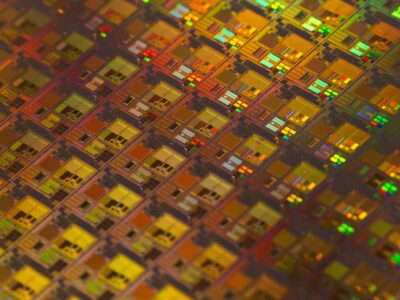Semiconductors and Geopolitics Symposium:
The Future of the Global Semiconductor Industry
Host Institutions:
- Rajawali Foundation Institute for Asia, Harvard Kennedy School
- Fairbank Center for Chinese Studies, Harvard University
- M-R Center for Business and Government, Harvard Kennedy School
- Taipei School of Economics and Political Science (TSE), National Tsinghua University
Supported by: Taipei School of Economics and Political Science Foundation (TSEF)
(哈佛大學會議網頁)
在不斷升溫的美中競爭之下,兩國都加快了限制關鍵技術領域重要出口的政策。台灣作為全球半導體行業的主要強權,正經歷著供應鏈、投資、貿易、勞動力、國家安全和成本的根本變革。特別在2022年11月美國CHIPS和科學法案通過的推動下,美國和國際半導體製造公司正在美國各地新興製造中心啟動或擴大業務。然而,工作文化的差異,人才短缺、供應鏈成本的上升等因素都帶來了重大的挑戰。
時值此一重要時刻,台北政經學院基金首次邁向國際,與清華大學台北政經學院和美國哈佛大學在美東時間9月11日於哈佛甘迺迪學院,邀集台美頂尖學者和行業專家齊聚一堂,從供應鏈到產業政策和地緣政治,討論半導體行業面臨的挑戰。
Under the rising competition between the United States and China, both countries have expedited policies to restrict the exports in key technological areas. Taiwan, as a major powerhouse in the global semiconductor industry, is undergoing fundamental changes in its supply chain, investment, trade, workforce, national security, and costs. Especially with the push from the U.S. CHIPS and Science Act passed in November 2022, U.S. and international semiconductor manufacturing companies are initiating or expanding operations in emerging manufacturing centers across the United States. However, differences in work culture, talent shortages, and the rise in supply chain costs have presented significant challenges.
At this crucial moment, the Taipei School of Economics and Political Science Foundation took its first step onto the international stage. In collaboration with the Taipei School of Economics and Political Science of National Tsing Hua University and Harvard University in the United States, a gathering of top scholars and industry experts from Taiwan and the U.S. took place on September 11 at the Harvard Kennedy School. Discussions covered challenges faced by the semiconductor industry, ranging from supply chains to industrial policies and geopolitical factors.
Dates: September 11
Venue: Malkin Penthouse, Harvard Kennedy School
September 11:
Location: Malkin Penthouse
8:30am-9am – Welcome: Tony Saich (Harvard Kennedy School) and W. John Kao (President, National Tsing Hua University)
9am-10:30am — Panel A – Risk & Global Value Chains: Where is the Leverage?
Speakers: Chin-Tay Shih (National Tsing Hua University); Willy Shih (Harvard Business School); Kazumi Nishikawa (Ministry of Economy, Trade & Industry, Japan)
Chair: Chris Miller (Tufts University)
10:30am-10:45am — Break
10:45am-12pm — Panel B – Talent & Eco-systems: What Drives the Shortage?
Speakers: Burn J. Lin (National Tsing Hua University); Rachel Lipson (US CHIPS Office)
Chair: Edward Cunningham (Harvard Kennedy School)
12pm-12:30: Break
12:30pm-1:30pm – Lunch
Location: Malkin
1:45pm-3:15pm — Panel C – Geopolitics & Free Trade: What are Costs of Current Tensions?
Speakers: Chang-Tai Hsieh (University of Chicago); Mark Wu (Fairbank Center, Harvard University), Laurie Self (Qualcomm)
Chair: Joseph Nye (Harvard Kennedy School)
3:15pm-3:30pm — Break
3:30pm-5pm — Panel D – From Reshoring to ‘Friendshoring’: Can Industrial Policy Work for Semiconductors?
Speakers: Tain-Jy Chen (Taipei School of Economic and Political Science, National Tsing Hua University); Fiona Murray (MIT)
Chair: Chang-Tai Hsieh (University of Chicago)
董事長晚宴致詞
(The Charles Hotel,9月11日)
Prof. Tony Saich, Prof. Mark Wu, President Kao, distinguished speakers, ladies and gentlemen:
Relationship with Harvard
Today, we gather here to celebrate the conclusion of a remarkable Symposium on Semiconductors and Geopolitics. This occasion also brings to mind my time as a visiting scholar at the Fairbank Center at Harvard University from 1996 to 1998 and the advisership offered by Prof. William Kirby. My time at the Fairbank Center was more than an academic endeavor – it was an exploration of ideas, cultures, and diverse perspectives. Engaging with fellow scholars from around the world broadened my horizons and enlarged the scope of my intellectual realm.
Conferences at Harvard
During those two years, in collaboration with Prof. Ezra Vogel, I had the pleasure to bring together scholars from Harvard, Taiwan, and mainland China. The topics ranged from village elections on both sides of the Taiwan Strait to the evolution of their party-states over time. To my knowledge, the former was the first conference that examined this topic academically. The conference, indeed, attracted many outstanding scholars from the New-England-area, with the notable presence of Prof. Benjamin Schwartz and Prof. Roderick MacFarquhar. Professor Samuel Huntington and Prof. Juan Linz were both invited to be the keynote speakers.
Moreover, several young scholars who attended these conferences have also become very well-established in their own areas. Two of them, who were actively involved in organizing these conferences, are especially worth mentioning: Dr. Chia-long Lin and Prof. Yongnian Zheng. Dr. Lin is now the Secretary-General of Taiwan’s Presidential Office. Prof. Zheng is now the Director of the Advanced Institute of Global and Contemporary China Studies at the Chinese University of Hong Kong in Shenzhen. He is also, reportedly, one of the seven scholars who were invited to attend a meeting presided by Xi Jingping.
TSE and TSEF
Before I came to Harvard, I had been elected as a legislator in Taiwan for three times. After returning to Taiwan, I was a Control Yuan member twice, and the first minister of the Transitional Justice Commission.
Three years ago, I had the opportunity to receive a donation of 100 million US dollars to create a foundation and a world-class school of economics and political science. I invited various former ministers of education and university presidents to be board members of the Taipei School of Economics and Political Science Foundation. After an 18-month long preparation, the Foundation has successfully hosted four TSEF fora and a major international conference featuring distinguished speakers like Niall Ferguson, Daron Acemoglu, and Joe Stiglitz. Today’s semiconductor conference marks the Foundation’s international debut and it may well be the first conference of its scale to discuss this important topic. I’ve found that many conclusions from conferences held at Harvard eventually shaped policies adopted by the US government. I hope our conference today will also have such an impact in the near future.
Two Pillars
As one of our Forum speakers, Francis Fukuyama, famously pointed out, the collapse of the Soviet Union symbolized “the end of history” and the victory of democracy and market economy.
However, as noted by Cambridge professor, David Runciman, while democracy defeated Nazism and Stalinism in the 20th Century, in the 21th century, it faces the grave challenge of a pragmatic authoritarianism, and as professor Larry Diamond has observed, democracy appears to be going through a “midlife crisis”.
In particular, amidst the US-Sino chip war, it seems the US has adopted policies that have deviated from the principle of market economy, along with democracy, which are thetwo long-standing pillars of the American strength since its Founding.
Win-Win Solution
I am always impressed by Michael Oakeshott, who used to famously say: “History is what the evidence compels us to believe.” Therefore, I firmly believe that our discussion of the various issues surrounding the semiconductor industry would be significantly more fruitful when understood in a larger historical context and guided by the wisdom of the history.
Let us approach this challenge with foresight, collaboration, and an unwavering commitment to ensuring that the semiconductor industry continues to be a catalyst for progress rather than a source of conflict. By fostering understanding and cooperation, we can navigate the complexities ahead and build a win-win solution for generations.
Thank you and I wish everyone a pleasant evening.
會議集錦
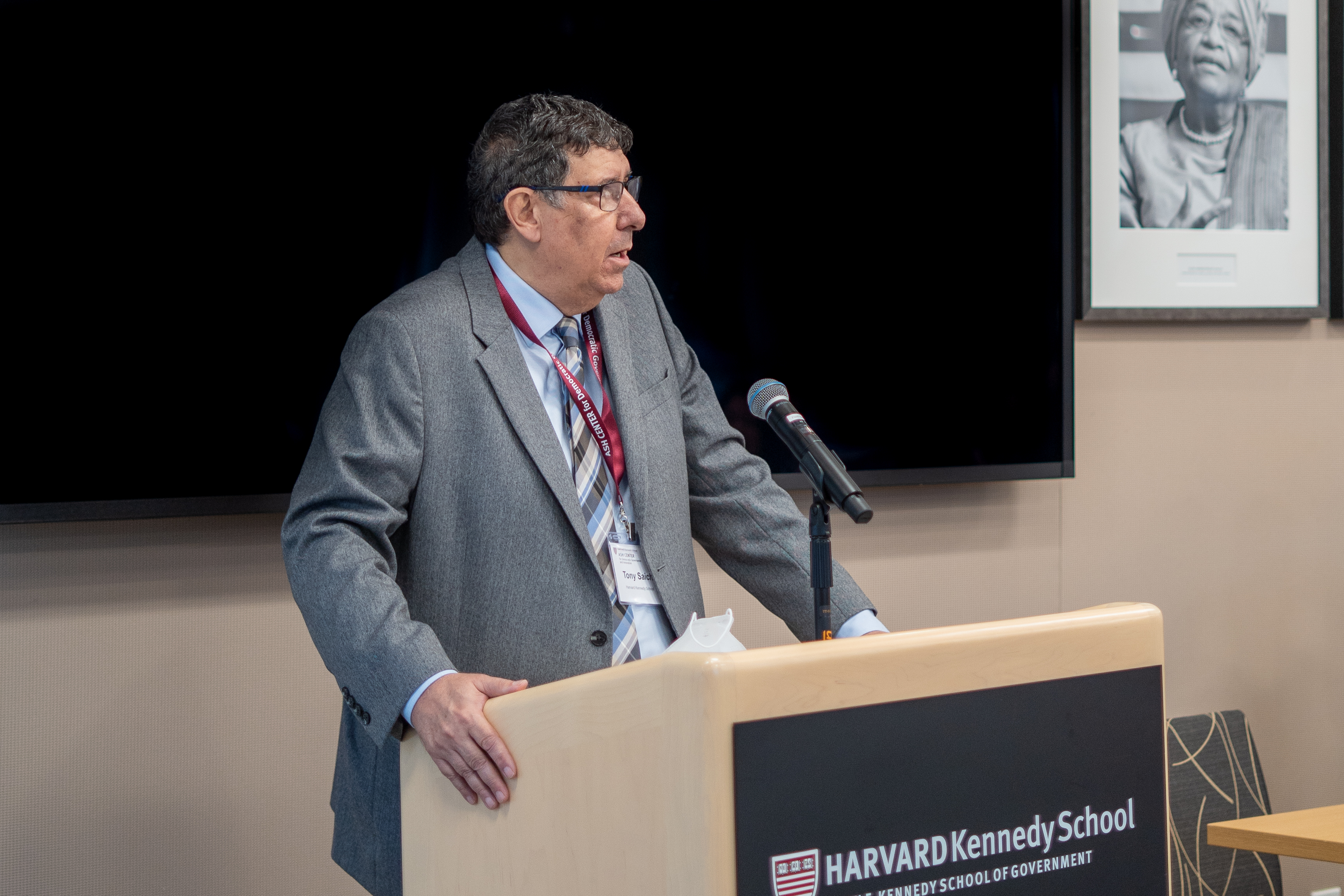
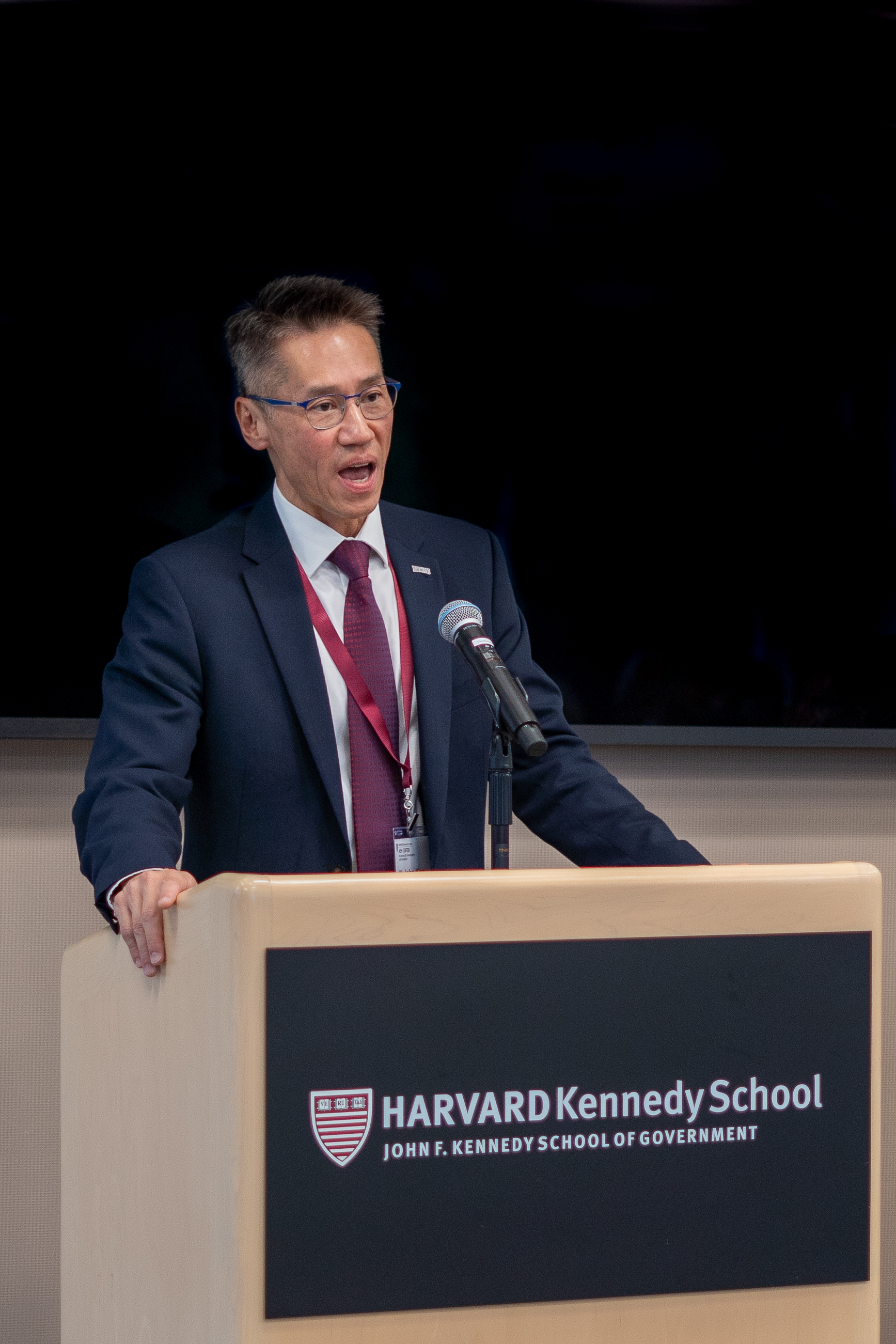
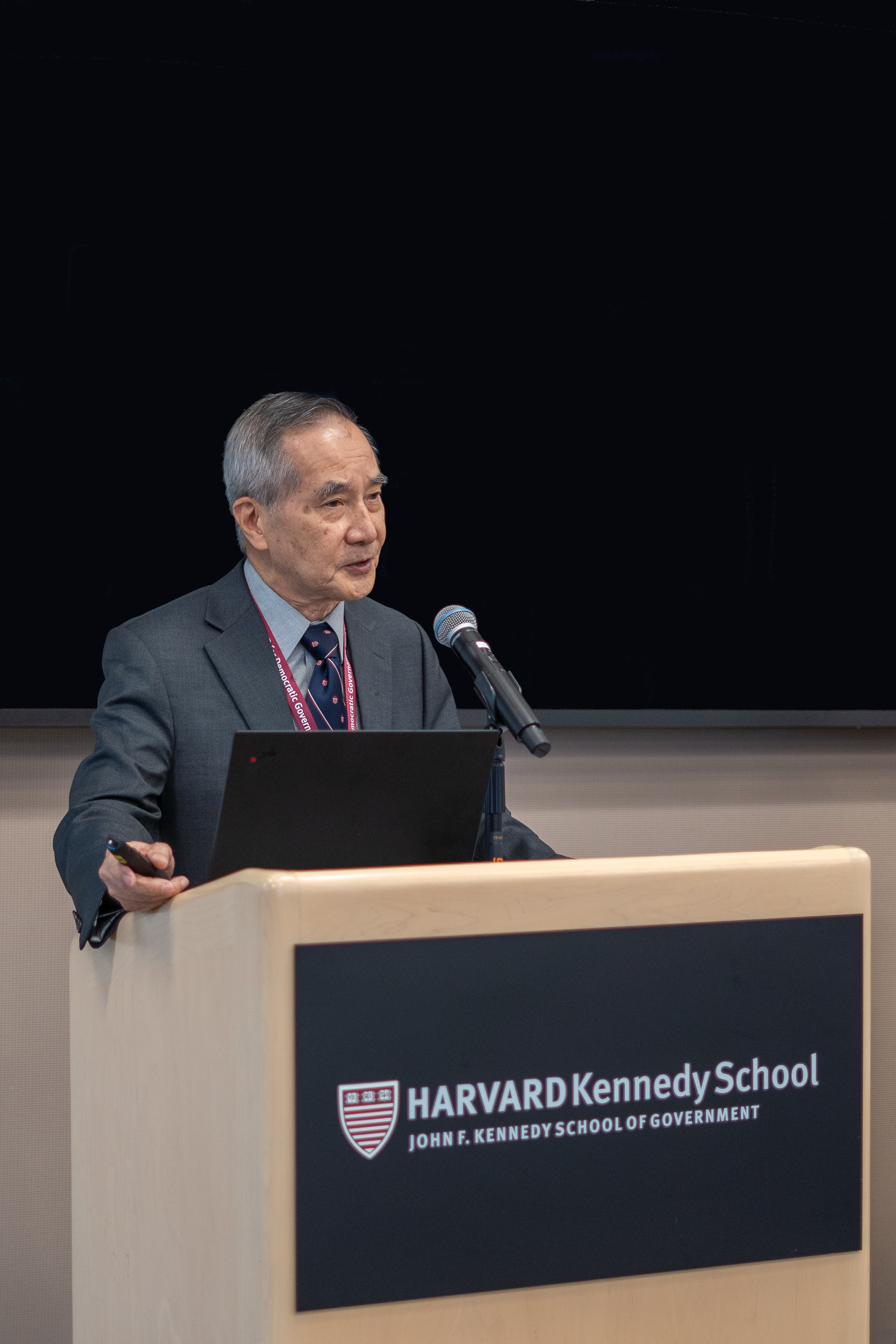
Panel A
旨在探討半導體產業的全球供應鏈。Kazumi Nishikawa分析日本受到美中情勢、疫情等衝擊而產生的政策轉變,包含將半導體政策從一般產業政策提升為經濟安全政策。史欽泰教授強調半導體供應鏈的複雜性並回顧台灣半導體產業發展史,呼籲全球半導體和未來科技發展仰賴開放、自由流通的貿易,台灣也應持續創新、合作、調整策略以維持優勢。Willy Shih則討論半導體專業化分工、供應鏈多元化、美國產業重建、需求端重要性等多項議題。
Aiming to explore the global supply chain of the semiconductor industry, Kazumi Nishikawa analyzes the policy changes in Japan resulting from the impacts of the U.S.-China situation and the pandemic. This includes elevating semiconductor policy from a general industry policy to an economic security policy. Professor Chin-tay Shih emphasizes the complexity of the semiconductor supply chain and reviews the developmental history of Taiwan’s semiconductor industry. He advocates for global semiconductor and future technological development relying on open, freely flowing trade, urging Taiwan to continue innovating, collaborating, and adjusting strategies to maintain its advantages. Willy Shih discusses various issues, including the specialization of semiconductor work, diversification of the supply chain, U.S. industrial reconstruction, and the importance of the demand side.
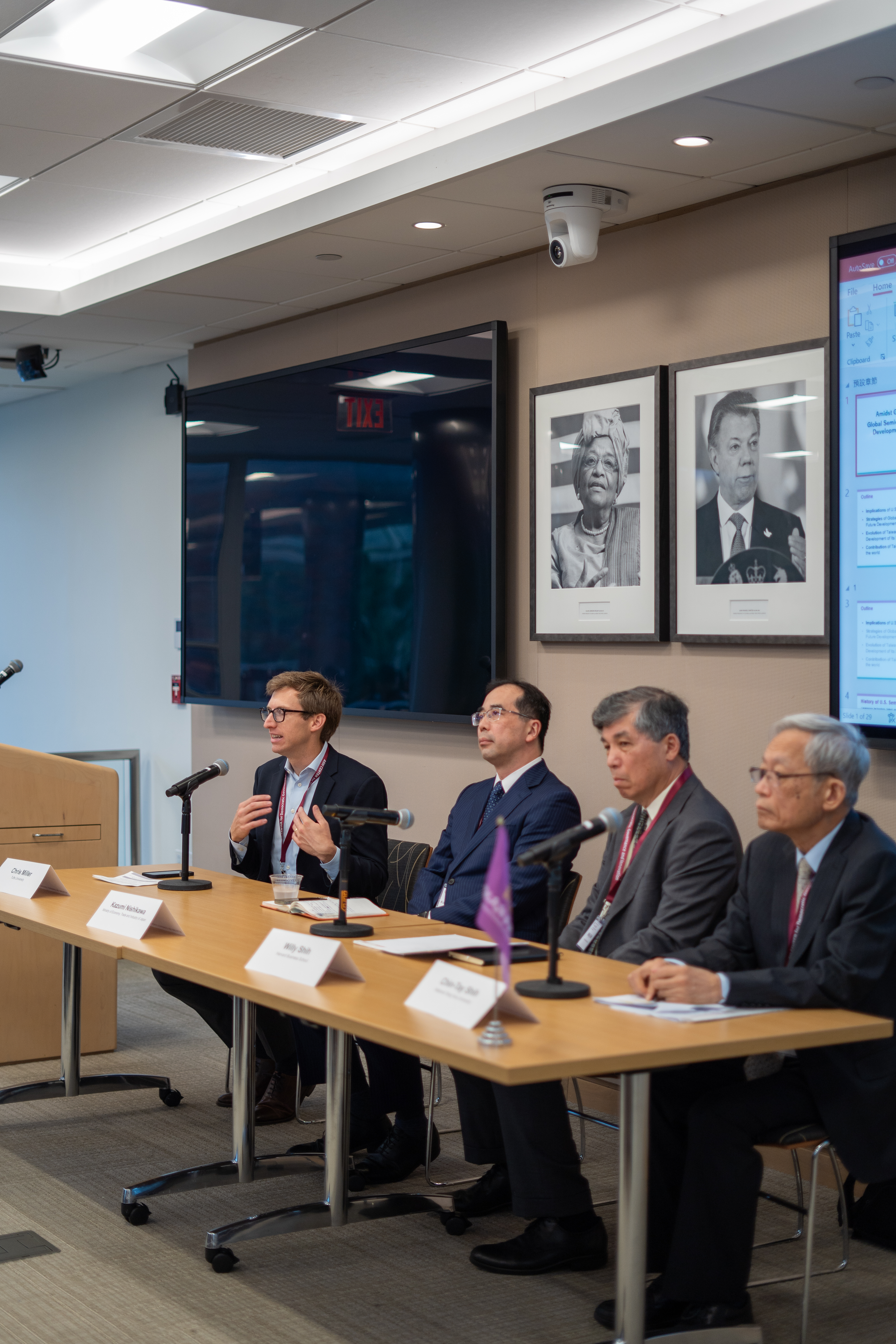
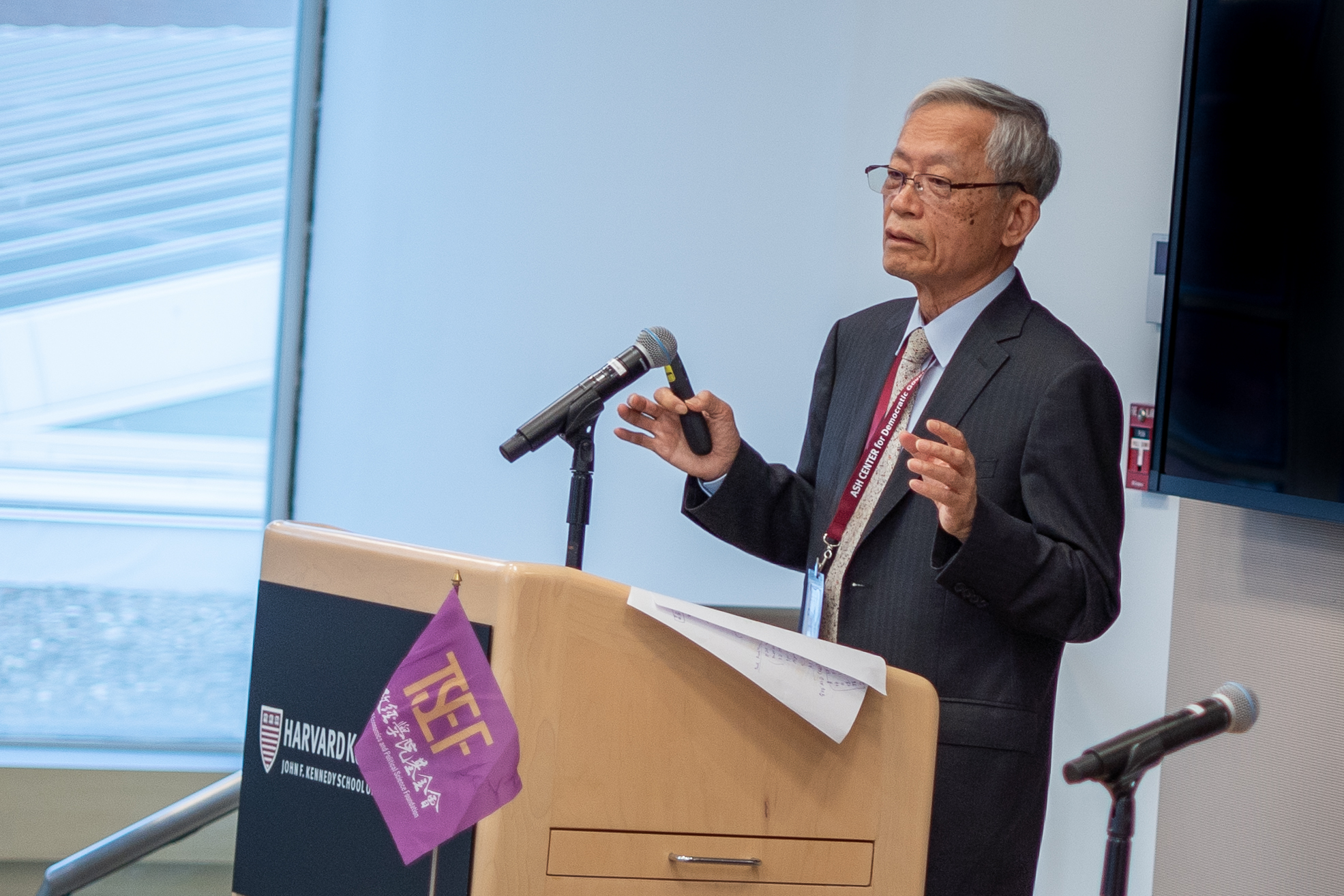
Panel B
旨在探討半導體產業生態和人才短缺困境。Elisabeth Reynolds認為美國近期通過重大法案、大規模增加投資,象徵產業政策的重大轉變,並主張長期轉型的過程尤為關鍵,私部門投資、競爭、做中學等因素在其中不可或缺。林本堅教授則指出半導體人才短缺的根本原因在於製程的複雜性,勢必需要國際分工,同時提出軍用、民用相輔相成和分工的想法。另外,半導體產業除了面臨其他產業競爭而流失人才,林教授亦提出在業內,人才集中於特定製程、缺少博士人才等現象的原因與解決方案。
Aiming to explore the ecosystem and talent shortage challenges in the semiconductor industry, Elisabeth Reynolds believes that recent significant legislation and substantial increases in investment in the United States signify a major shift in industrial policy. She advocates that the long-term transformation process is crucial, with private sector investment, competition, and learning-by-doing being indispensable factors. Professor Burn Lin points out that the fundamental cause of the semiconductor talent shortage lies in the complexity of the manufacturing process, necessitating international division of labor. He also proposes the complementary relationship and division of labor between military and civilian applications. Additionally, besides losing talent to competition from other industries, Professor Lin highlights the concentration of talent in specific processes within the semiconductor industry and the lack of doctoral-level talent, providing reasons and potential solutions for these phenomena.
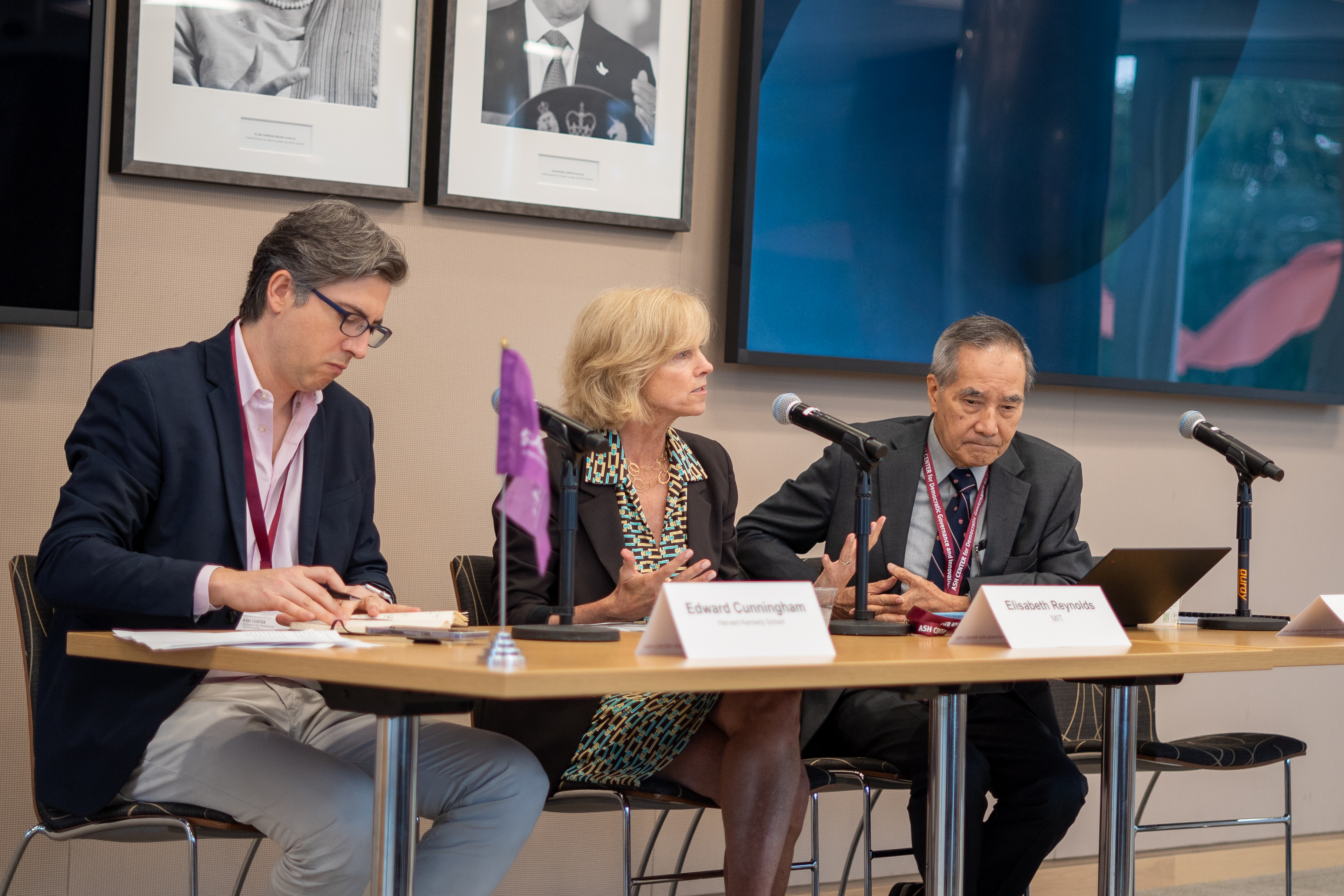
Panel C
旨在探討拜登貿易政策的有效性。Joseph Nye藉由分析美中關係史,以及現今情勢與冷戰的相異之處,主張脫鉤和封閉的成本過高且成效有限。並提出台積電對中國和全球的重要性,認為應透過互賴和威懾維持台海現狀。Mark Wu強調全球貿易已進入不同於自由貿易的新典範,討論美國和其盟友實施新貿易政策的必要性、成本與成效。謝長泰教授則主張美國的新貿易政策並不能有效解決安全問題,反而會掏空台灣的核心產業和破壞中國對台灣的互賴關係。
Aiming to explore the effectiveness of Biden’s trade policy, Joseph Nye, through an analysis of the history of U.S.-China relations and the differences between the current situation and the Cold War, argues that decoupling and containment are costly and yield limited results. He highlights the significance of TSMC for both China and the global landscape, suggesting that maintaining the status quo in the Taiwan Strait should be achieved through interdependence and deterrence. Professor Mark Wu emphasizes that global trade has entered a new paradigm different from free trade, discussing the necessity, costs, and effects of the United States and its allies implementing new trade policies. Professor Chang-tai Hsieh contends that the new U.S. trade policy cannot effectively address security issues; instead, it may hollow out Taiwan’s core industries and disrupt the interdependence between China and Taiwan.
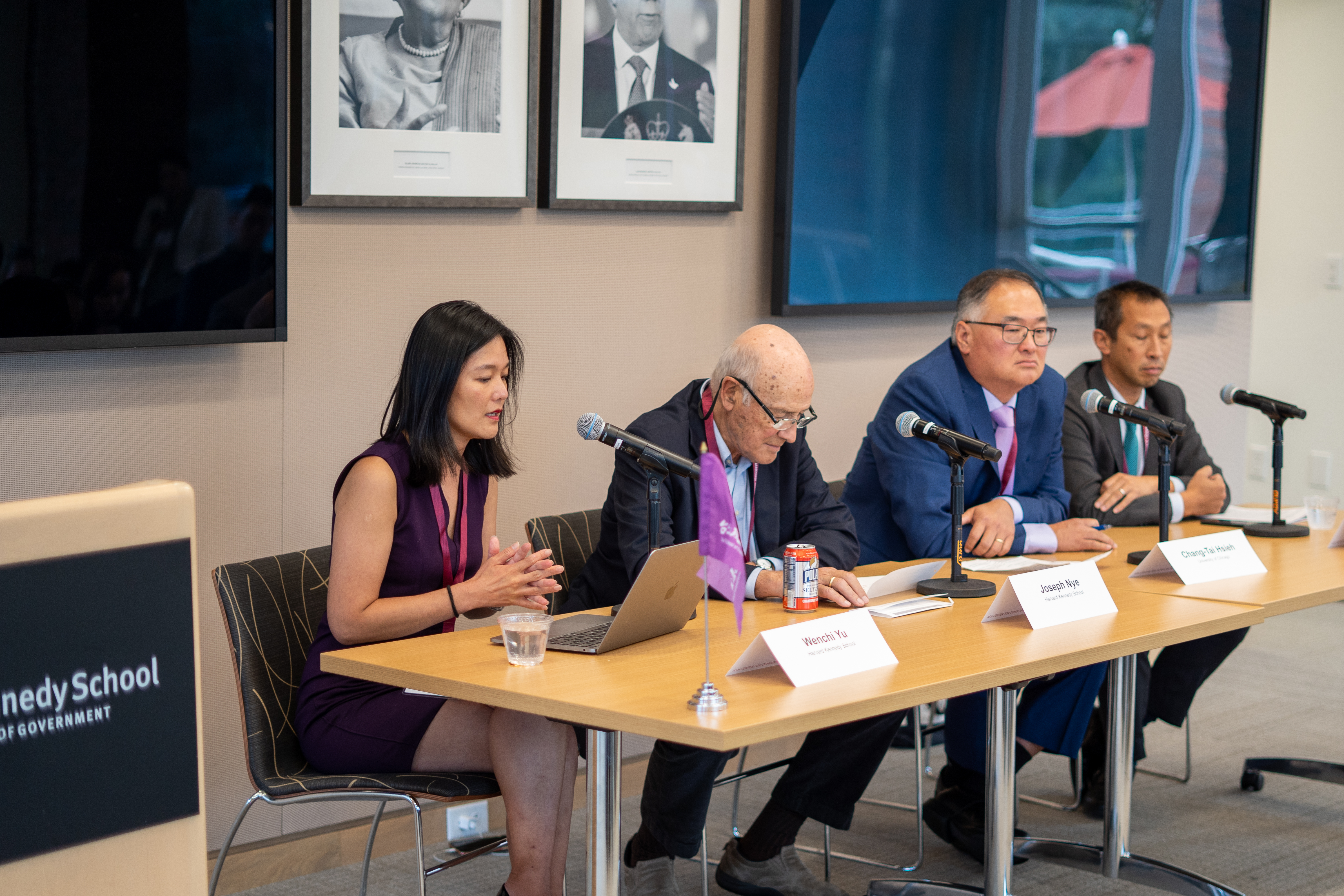
Panel D
主講人和主持人透過回顧台灣半導體產業政策的起源與發展過程,歸納產業政策成功所須的政治、經濟、社會、基礎建設、教育等等諸多條件,Fiona Murray也指出需要長期共識支撐的產業政策,難以在美國的現行政治制度和高度仰賴私部門的經濟體實行。陳添枝教授指出半導體產業的特殊之處在於需要大量資金的不斷投入才能促成一代又一代的研發。而針對半導體產業的發展,各國需要在自主和互賴間尋求平衡,原先極力避免涉入政治的台灣半導體產業界,也在全球政治局勢和競爭下不得不處理相關議題。
The speaker and the moderator, through a review of the origin and development of Taiwan’s semiconductor industry policies, summarize the various conditions necessary for the success of industrial policies, including political, economic, social, infrastructure, education, and more. Fiona Murray also points out the need for industry policies supported by long-term consensus, which may be challenging to implement in the current political system in the United States and its highly private sector-dependent economy. Professor Tain-Jy Chen emphasizes the uniqueness of the semiconductor industry, requiring continuous investment of substantial funds to facilitate successive generations of research and development. Regarding the development of the semiconductor industry, countries need to seek a balance between autonomy and interdependence. The Taiwanese semiconductor industry, which initially sought to avoid political involvement, is now compelled to address related issues due to global political dynamics and competition.

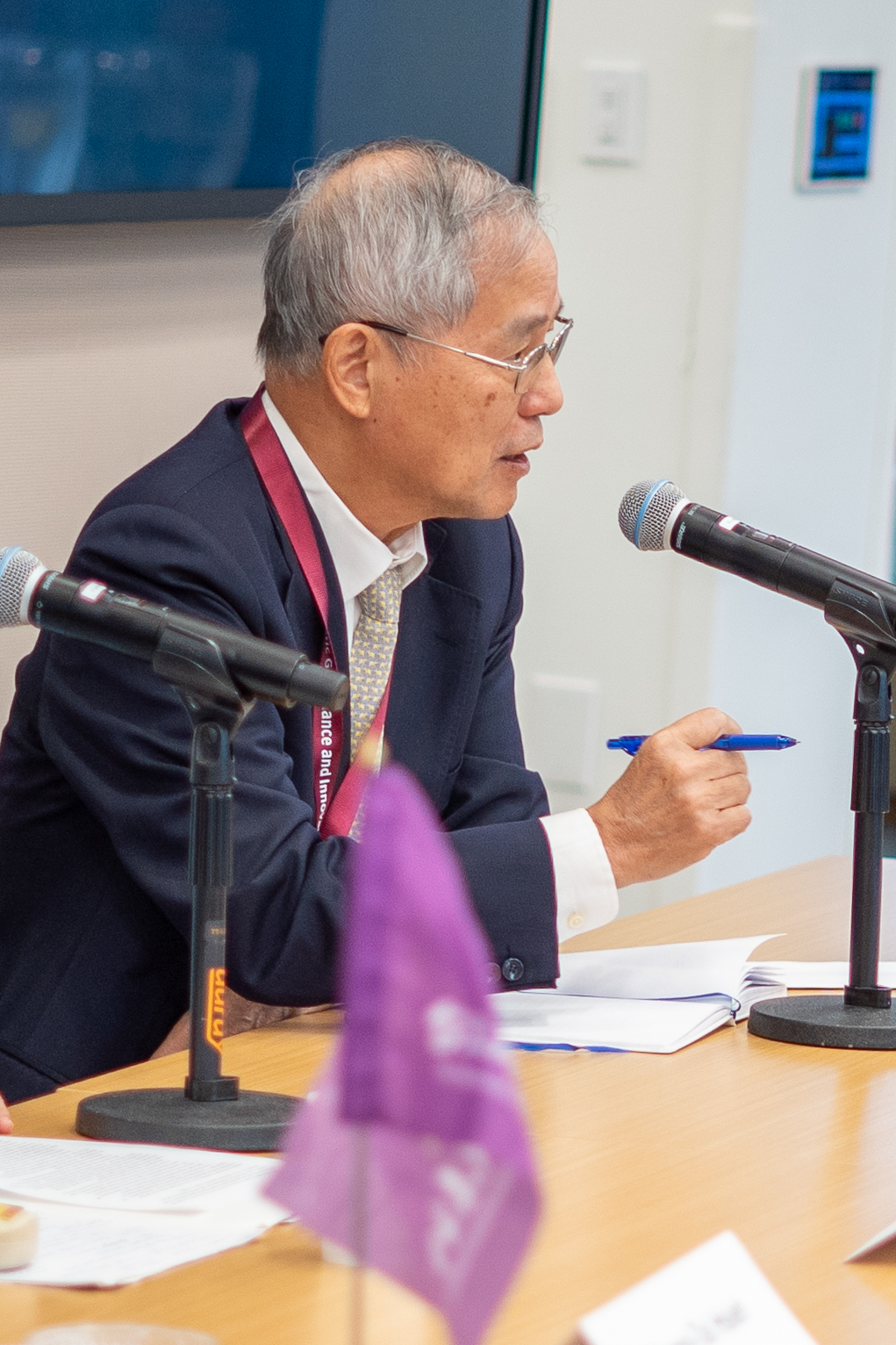
國際媒體投書
會後,代表團一行在彙整會議心得與歷次線上討論之後,由謝長泰院士,林本堅院長與史欽泰院長三人領銜,撰寫社論「How America’s CHIPS Act Hurts Taiwan」一文,並於2024年2月26日在著名專業評論網站「Project Syndicate」刊出(網路連結)。在刊出後的一週之間,此文在該網站得到最多人的點閱。

此文在刊出後,亦立即引發國內主要媒體轉載以及報導:
- 科技新報:補助改變台積電初心!林本堅等人談「美晶片法案如何傷害台灣」
- 自由時報:台灣半導體大老:美《晶片法案》傷害台灣 削弱台積電
- 聯合報:學者批美晶片法 傷害台積電
- 經濟日報:美晶片法案恐造成台灣內傷 林本堅、史欽泰等憂心台積電將面臨三大風險
- 風傳媒:台積電功臣直言不諱 林本堅:美國《晶片法》如何傷害台灣?
- 財訊:補助改變台積電初心!林本堅等人談「美晶片法案如何傷害台灣」




